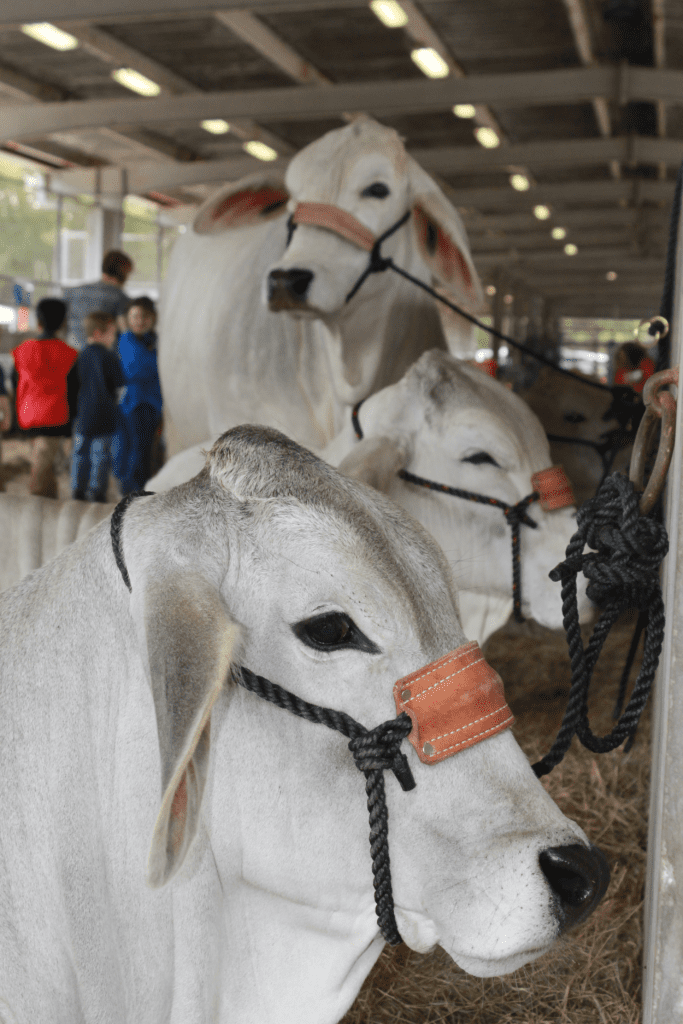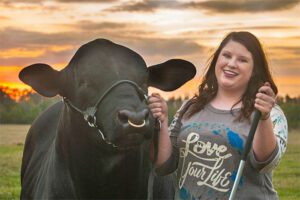Youth and Ranchers Are Gearing Up for the Commercial Steer Show
Agricultural fairs have a rich legacy in Polk County. It was in the 1940s that the community came together to fund a pavilion in Bartow specifically for young people to compete in agricultural and domestic projects. Over the years, the Polk County Youth Fair has been a cherished tradition for many families, and introduced many young people to an industry and lifestyle they may otherwise have been ignorant of.
The youth fair encompasses dozens of categories, so it’s easy to find something to get involved in. Students can choose to raise an animal, such as a goat or market steer, enter a horticultural contest like raising a peach tree, or any number of domestic projects ranging from canned and baked goods to needlework and scrapbook projects. This array of options makes it possible for kids to choose something that suits their interests as well as their budgets.
The students are responsible for working on their project throughout the year before showing in the fair, which takes place at the end of January. Market animals (steers and hogs) are required to be sold at the fair. Students raising market animals are also required to market their livestock to prospective buyers by sending out flyers before the sale.
The commercial steer raising competition was started in 2013 as a way to encourage more young people to get involved with the Polk County Youth Fair. Some students are interested in raising a steer in order to turn a profit, whereas others wish to show their animals at other fairs for accolades and potential prize money. Not every kid has the resources or the desire to raise a steer that can run upwards of $5,000 in investment. The commercial steer raising project has a lower initial cost, with the calves currently selling for about $800-$900.
Barrett Chandley, one of the cattlemen providing calves, says, “As producers, we want as many kids involved as possible to get the experience and to raise a meat animal.” Some local ranchers got together and decided they wanted to see more kids getting the chance to compete without taking anything away from the kids who raise the prize winners. So, they instituted the commercial steer show.
Calves are provided by five or six ranchers. They have a selection day in June, upon which about a dozen calves are shown and kids are randomly assigned a picking order. The students purchase the calves at market price, which is determined by research conducted by the UF/IFAS office. “Right off the bat, the kids are presented with a market animal at fair market value, and they’re given the chance to make money off of it,” Chandley explains. The goal is to get to a point where they are able to bring in about 40 uniform calves, so that students are assured that they are all starting on equal footing.
The ranchers providing these calves are all Florida cattlemen with a vested interest in cattle breeds that can be raised efficiently in the south and Central Florida climate. The students’ projects also provide valuable feedback to the cattlemen on how the calves grow. The relationship provides unique insights to both ranchers and students.
Students pay for the calf and raise it themselves, but not without mentors to turn to. Cattleman Dr. Robert “Doc” Gukich is another rancher involved with the commercial steer sale. “The kids I’ve sold calves to have done a very good job,” he says. “Some have become repeat buyers from me.” The ranchers really enjoy the opportunity to share what they’ve learned over the years with the younger generation.
Visitors to the youth fair can buy a steer at the auction and then split the cost with a packer if they don’t wish to have the animal butchered and wrapped for their own use. The packer sets a price, and the difference between the packer price and the amount the steer sells for is given back to the student as profit. Last year, the average profit per student was about $900. Not bad for a kid’s project!
All in all, the Polk County Youth Fair is a boon to students and professionals in the agriculture industry. It’s a great way to get kids excited about fields that too many young people are unaware of. The commercial steer show is bringing new life to the Central Florida cattle industry, and the older generation couldn’t be happier about it.
by TERESA SCHIFFER


